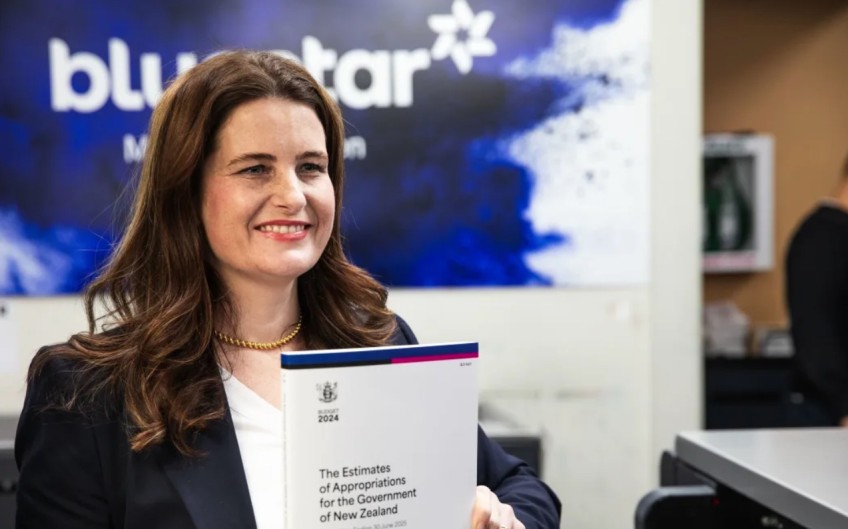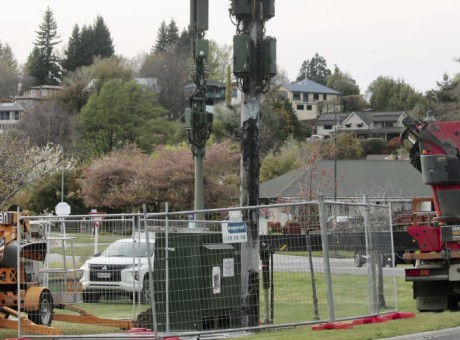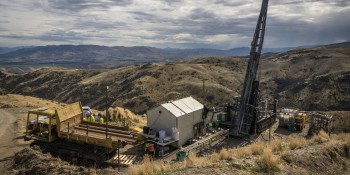National unveils Budget 2024, keeps tax cut promises

National has kept its tax cut promise in the coalition's debut Budget, laying out a relief package largely in line with the 'Back Pocket Boost' it campaigned on during the election.
Much attention had focused on the teased tax relief in the lead up to today's reveal, with many economists calling for it to be scaled back or more gradually phased in.
Unveiling her first Budget this afternoon, Finance Minister Nicola Willis declared: "I have kept my pledge".
Willis described the near $15b tax cut package as "fully funded" over four years, pointing to $23b in savings across the public sector over the same time.
The government expected to borrow an extra $12b during that same period.
Asked why she pushed ahead with tax cuts rather than reducing debt, Willis said doing otherwise would have meant breaking their commitment to New Zealanders: We chose not to do that.
Willis characterised her first Budget as a "clean-up job" which delivered on key coalition promises.
"This Budget wont fix all of New Zealand's economic challenges on its own and there is much more to do, but it does show what is possible with care and discipline."
'Back Pocket Boost' is back
The Budget documents stated 1.9 million households would benefit from the overall relief package by an average of $30 a week. Households with children would benefit by $39 a week on average.
A minimum wage worker could expect about $12.50 a week, while superannuitants would take home just $4.50 a week.
The key plank of the policy was an adjustment to income brackets, with tax rates remaining the same but the thresholds where they kicked in increasing.
The Independent Earner Tax Credit is also being expanded, with the upper limit for eligibility rising from an income of $48,000 to $70,000, with amounts reducing from $66,000+ instead of $44,000+.
National campaigned on enacting these changes at 1 July, but the start date has been pushed back four weeks after advice from Inland Revenue to allow payroll providers more time.
The in-work tax credit will also go up by up to $25 a week from 31 July. National had campaigned on that kicking in from 1 April.
The relief package also includes a childcare payment for low-and-middle-income households as already announced by Willis in March.
The original 'Back Pocket Boost' policy included an increase to Working for Families, but that promise was discarded during coalition negotiations.
During those negotiations, National also agreed to consider whether ACT's idea of a flatter tax system could be incorporated "subject to no earner being worse off than under its plan.
Willis said ACTs idea of reducing the number of tax rates had a lot of merit but was not possible this year or this term: It remains, however, an idea for the future.
The overall policy is costed at $3.7b a year which Willis said was fully-funded through specified savings and revenue initiatives.
Nip and tuck
Willis said a line-by-line review of government spending had identified an average $5.86b a year across 240 savings and revenue initiatives.
That included a baseline savings exercise across government departments which had raised more than $1.5b a year.
Most departments met or came close to their savings target of 6.5 percent or 7.5 percent with the notable exceptions of the Defence Force, Police, and the Ministries of Foreign Affairs and Justice.
The Ministry of Housing significantly exceeded its savings goal of $109m, instead cutting its baseline by $391m.
Initiatives in line for a funding shave include the NZ Symphony Orchestra, the Human Rights Commission, the Major Events Fund, and the Climate Change Commission.
The Warmer Kiwi Homes scheme is also being scaled back with the end of subsidies for hot water heating and an outreach programme to target hard-to-reach households.
Some savings have been recouped by shifting the first-year of Fees Free to the final year of study, taxing online casino operators, and increasing immigration fees.
Savings and reprioritisations will be a business-as-usual activity for all ministers so that we can put the books back in order, Willis said.
Not all promises kept
During the campaign, National pledged to give Pharmac an extra $70m a year over four years in ring-fenced funding to target 13 specific cancers.
The government regretted that it had not been possible in this Budget, Willis said.
She pointed to the major investment required in Pharmac and cited difficulties with the promise, given it would result in a significant shift to Pharmac's operating model.
Regardless, Willis said the coalition remained committed to following through on its commitment in future Budgets.
"We are determined to deliver it and we will."
Budget at a glance by Russell Palmer of RNZ
Tax and economy (spending on average $3.68b more a year in new initiatives):
- $2.57b on tax cuts through bracket adjustments unchanged from what National set out in the election campaign
- $155m on Independent Earner Tax Credit eligibility changes in line with National's election campaign
- $182m on In-Work Working For Families Tax credit by $25 a week, in line with National's election campaign (the change to abatement thresholds was abandoned during coalition negotiations)
- $729m on restoring interest deductibility for residential rental property
- $45m on adjusting the brightline test
Announced before the Budget
Savings and new funding (additional $3.71b a year in revenue):
Note that the climate funding and closure of Labour programmes includes savings found in the mini-Budget in December.
- $1.215b in total baseline savings from government departments and agencies not reprioritised
- $775m on closing previous programmes
- $597 of funding from the Climate Emergency Response Fund paid for through the ETS
- $578m from commercial buildings depreciation
- $1.195b over four years from expanding the Waste Disposal Levy to cover a wider range of projects (with half of revenue still going to local government)
- $462.8m over four years from scrapping the Wellington Science City project
- $133m from immigration levies including $261.9m over four years from increased International Visitors levies
- $47m from taxing online casino operators
- $178m over four years in savings from the Energy Efficiency and Conservation Authority, including discontinuing new Warmer Kiwi Homes subsidies for hot water heaters, energy-efficiency measures, an LED lighting scheme, and community-focused outreach for hard-to-reach households
- $220m from switching fees-free from first year to final year of university
- $147m from tax evasion crackdown
- $116.1m over four years from reinstating the $5 prescription fee for ages 14-64, made up of $269m over four years in total savings and $153.5m over four years due to increased uptake from the policy.
- $164.5m over four years returned from contingency funding for pricing an agricultural emissions scheme
- $5.55m over four years less spent on NZ Film Commission, NZ Symphony Orchestra, and Nga Taonga Sound and Vision
- $5.72m over four years from scrapping the Consumer Advocacy Council, and $38.27m over four years from scaling down other energy programmes like the Community Renewable Energy Fund
- $300,000 for scrapping the Circular Economy and Biosecurity Strategy
Announced before the Budget
- Revised Free School Lunches, now costing $477.55 from 2024 to 2027
Education ($1.01b):
- $1.48b over four years for school and kura kaupapa property
- $199.5m over four years for school operating grants
- $191m over four years for ECE subsidies
- $163m over four years to maintain school IT infrastructure
- $256m over four years to increase tertiary tuition and training subsidies to providers by 2.5%
- Student loan interest rates for overseas borrowers to increase from 3.9% to 4.9% from 1 April 2025
Announced before the Budget
Health, disability and mental health:
Health NZ Te Whatu Ora is set to receive $16.68b in new funding over three Budgets:
- $3.44b over four years for Health NZ hospital and specialist services
- $2.12b over four years for primary, community and public health
- $1.77b over four years to maintain Pharmac funding
- $1.1b over five years to address demand and cost pressures for the Ministry of Disabled People Whaikaha
- $31.2m over four years to extend free breast screening
- $30.84m over four years to increase ED security
- $22m over four years to train 25 more doctors each year
- $9.7m over four years to set up a National Mental Health and Addiction Community Sector Innovation Fund
Announced before the Budget
Transport ($2.68b over four years):
- $1b over four years to accelerate Roads of National Significance
- $939.3 over four years to repair roads damaged during Cyclone Gabrielle, the Auckland floods and other North Island weather events
- $266.9m over four years to upgrade and maintain Auckland and Wellington rail networks, including $159.2m over two years to complete Auckland's rail network rebuild
- $200m over four years for KiwiRail national rail network maintenance and renewals
- $10m over four years for Airways NZ to complete minimum operating network of Ground Based Navigation Aids used to safely recover aircraft
- $44m to support Civil Aviation Authority to carry out core functions while fee, levy rates are reviewed
- $23.1m over four years for critical frontline rescue services to respond to severe weather events and emergencies
- Extra $1b over four years for the National Land Transport Fund
Announced before the Budget
Justice, police Corrections and defence ($651m over four years):
- $226.1m over four years for an extra 500 police
- $424.9m over four years to support frontline policing ($242.2m for police pay and $62.7m for vehicles and maritime capability)
- $78m over three years to extend rehabilitation programmes to remand prisoners
- $812.8m over five years for Corrections to respond to the increase in prisoners numbers
- Savings of $43.4m over four years from increasing court filing, enforcement and fine collection fees
Announced before the Budget
Other:
- $48.7m over three years from 2025/26 for Te Matatini
- $1.2b for a Regional Infrastructure Fund, including $200m for flood infrastructure upgrades
- $5m for the creation of the National Infrastructure Agency
- $106.9m over four years operational funding for GeoNet and the National Seismic Hazard Model
- $92.2m for National's replacement for the RMA reforms
Announced before the Budget
Main image (RNZ/Samuel Rillstone): Nicola Willis ready to present the 2024 Budget.





















